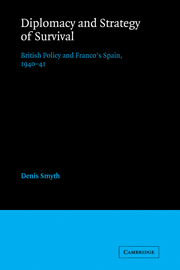Book contents
- Frontmatter
- Contents
- Preface
- Introduction
- 1 Britain and and the birth of Franco's Spain, 1936–39
- 2 Defining a policy
- 3 Opposition
- 4 The Spanish scene
- 5 Strategic diplomacy: September–October, 1940
- 6 Economic diplomacy: September–December, 1940
- 7 The Tangier crisis
- 8 The limits of attraction
- 9 The exhaustion of diplomacy
- Conclusion
- Notes
- Bibliography
- Index
- Frontmatter
- Contents
- Preface
- Introduction
- 1 Britain and and the birth of Franco's Spain, 1936–39
- 2 Defining a policy
- 3 Opposition
- 4 The Spanish scene
- 5 Strategic diplomacy: September–October, 1940
- 6 Economic diplomacy: September–December, 1940
- 7 The Tangier crisis
- 8 The limits of attraction
- 9 The exhaustion of diplomacy
- Conclusion
- Notes
- Bibliography
- Index
Summary
Perhaps even more than other forms of historical investigation, diplomatic history is inevitably a collective enterprise, for all that one person is usually acknowledged as the individual author of a particular study. The group of archivists, librarians, scholars, students, typists and friends who contribute to the production of any work of history is multiplied for the diplomatic historian by the number of different countries which attract his professional attention. Although sometimes inhibited from immersion in the historical culture of a particular country, to the extent possible for the domestic historian of a given society, by the need to ascertain simultaneous developments on ‘the other side of the hill’, the international specialist does have his compensations. The variety of his intellectual diet and cultural experience, as he studies – often at source and in situ – states with varying principles and policies at play in the ‘great game’, expands his mind but can also enrich his whole experience. Individuals and cultures become accessible, almost in an accidental way, as the international historian conducts his researches in a succession of cities and countries.
Therefore, the intellectual indebtedness of any diplomatic historian, and of this one in particular, to many people and places is often pronounced. Such debts can hardly be repaid – the creditors are too numerous, too dispersed and always too generous to want any sort of reimbursement – but they may be acknowledged.
- Type
- Chapter
- Information
- Diplomacy and Strategy of SurvivalBritish Policy and Franco's Spain, 1940-41, pp. ix - xiiPublisher: Cambridge University PressPrint publication year: 1986

